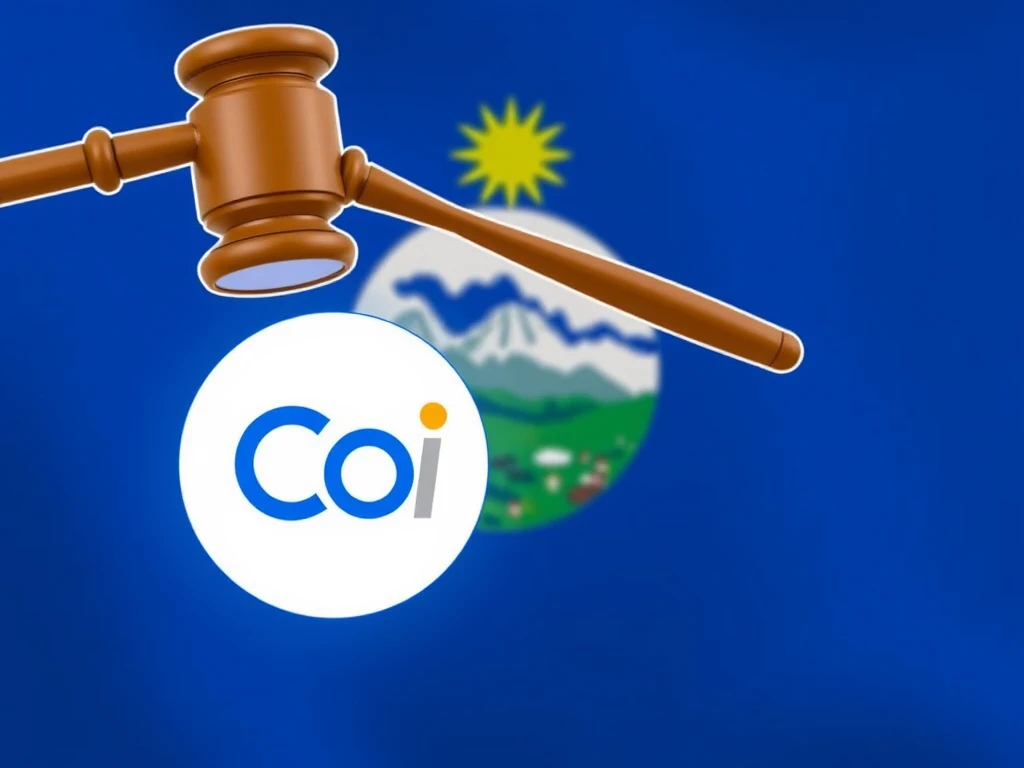Fresh Challenge: Oregon Targets Coinbase in New Crypto Regulation Push After SEC Retreat

The cryptocurrency landscape in the United States continues to be a battleground, not just at the federal level, but increasingly within state lines. Just as Coinbase seemed to catch a break with the Securities and Exchange Commission (SEC) dropping its federal lawsuit, a new challenge has emerged from the state of Oregon. This latest development underscores the fragmented and often perplexing nature of crypto regulation in America, leaving many in the industry wondering what’s next.
Why is Oregon Targeting Coinbase Now?
Oregon Attorney General Dan Rayfield is spearheading a new state regulation initiative against Coinbase, alleging that the crypto exchange is offering unregistered securities to Oregon residents. This move comes hot on the heels of the SEC’s decision to withdraw its 2023 federal lawsuit against Coinbase, a decision that initially appeared to signal a potential easing of regulatory pressures. According to Coinbase’s chief legal officer, Paul Grewal, Oregon’s lawsuit is a direct “copycat case” of the dropped SEC action. Grewal didn’t mince words, stating that Oregon’s Attorney General’s office explicitly indicated they are “literally picking up where the Gary Gensler SEC left off.”
This situation raises a critical question: Is this a case of state overreach, or a legitimate effort to protect investors within Oregon? Let’s break down the key elements:
- Timing is Everything: The Oregon lawsuit is launched immediately after the SEC, the primary federal regulator, backs down from its case. This timing is perceived by Coinbase as opportunistic and potentially politically motivated.
- “Copycat Case” Concerns: Coinbase argues that Oregon is simply rehashing the same arguments the SEC used and then abandoned. This raises questions about the validity and necessity of the state-level action.
- State vs. Federal Divide: This lawsuit highlights the growing tension between federal and state regulation in the crypto space. While federal clarity remains elusive, states are increasingly taking matters into their own hands, potentially creating a patchwork of conflicting rules.
The Shadow of the SEC Lawsuit and its Sudden Withdrawal
To fully grasp the current situation, it’s essential to understand the context of the previous SEC lawsuit. Under the chairmanship of Gary Gensler, the SEC adopted a notably aggressive stance towards the cryptocurrency industry. Coinbase, being one of the largest crypto exchanges in the US, became a prime target. The SEC’s lawsuit in 2023 alleged similar violations – the sale of unregistered securities. However, earlier this year, following Gensler’s resignation in January, the SEC abruptly reversed course and dropped the lawsuit.
This reversal was part of a broader trend. Post-Gensler, the SEC seemed to soften its approach, leading to a wave of dropped lawsuits and investigations against various crypto firms, including Uniswap and Kraken. Several US states, initially following the SEC’s lead, also withdrew their parallel lawsuits against Coinbase. Vermont, South Carolina, and Kentucky were among the states that dropped their litigation, citing the SEC’s changed stance and the establishment of a crypto task force within the agency as influencing factors.
The fact that Oregon is now proceeding with a similar lawsuit after this wave of withdrawals is particularly noteworthy and signals a potential divergence in regulatory philosophy among states.
Implications of Fragmented Crypto Regulation
Coinbase’s legal officer, Paul Grewal, has voiced strong concerns about the implications of this state-by-state regulatory approach. He argues that this fragmented landscape:
- Hinders National Policy: A patchwork of state regulation makes it incredibly difficult to establish a cohesive national crypto policy. Businesses like Coinbase are forced to navigate a complex web of potentially conflicting rules across different states.
- Stifles Innovation: Regulatory uncertainty and the cost of compliance with multiple state regulations can stifle innovation and growth within the crypto industry in the US. Companies might be hesitant to operate in or expand to states with overly restrictive or unclear regulations.
- Consumer Confusion: Different state rules can create confusion for consumers, making it harder for them to understand their rights and obligations when engaging with cryptocurrencies.
Grewal and Coinbase are advocating for federal lawmakers to step in and establish clear, unified market structure policies for the crypto industry. They believe that a federal framework is crucial to provide clarity, foster innovation, and protect consumers effectively.
What Does This Mean for the Future of Coinbase and Crypto Regulation?
Oregon’s lawsuit against Coinbase is a stark reminder that even with victories at the federal level, the crypto industry’s regulatory battles are far from over. Here are key takeaways:
- State-Level Scrutiny Intensifies: Despite some federal softening, individual states may continue to pursue their own regulatory agendas, potentially leading to increased compliance burdens for crypto companies.
- Legal Battles Will Continue: Coinbase and other crypto firms are likely to face ongoing legal challenges at both state and federal levels as regulators grapple with how to oversee this rapidly evolving industry.
- Federal Action Needed More Than Ever: The current situation underscores the urgent need for clear and comprehensive federal crypto regulation. Without it, the US risks falling behind other jurisdictions in fostering a thriving and well-regulated crypto ecosystem.
The unfolding situation in Oregon is a critical development to watch. It could set a precedent for other states and further complicate the already complex regulatory landscape for cryptocurrencies in the United States. For investors and industry participants, navigating this evolving environment will require vigilance, adaptability, and a strong understanding of both federal and state regulation.







